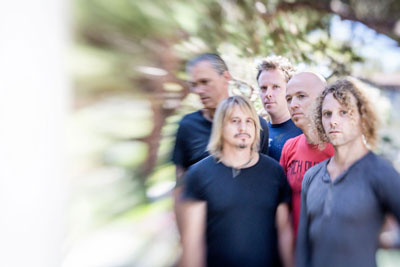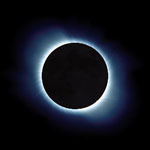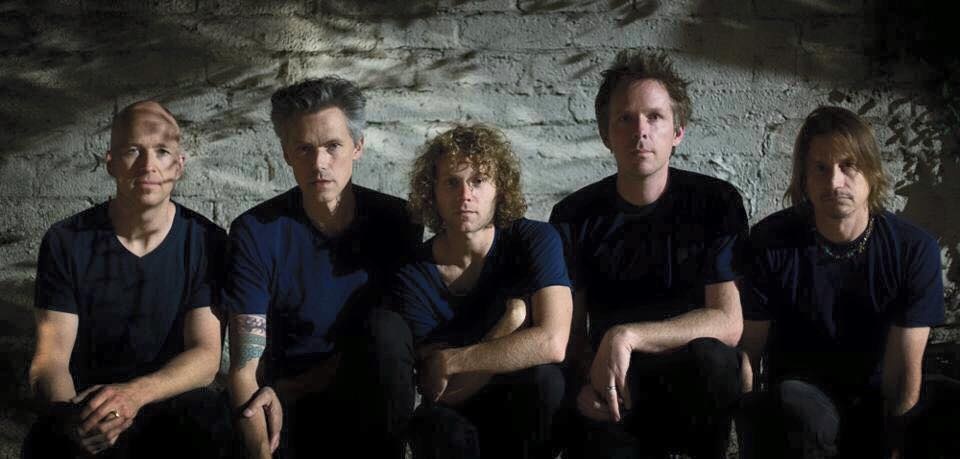Features
Perfect Beings: The Daily Vault Interview
by Jason Warburg

Perfect Beings: Johannes Luley, Chris Tristram, Jesse Nason, Dicki Fliszar, Ryan Hurtgen
The next wave of progressive rock is here, and Perfect Beings is among the acts riding it like a champion. Based in Los Angeles, but with roots all over the map, the quintet made one of the notable prog albums of 2015 in their sophomore album II, melding classic prog influences such as Yes, Pink Floyd and Genesis with a diverse sonic palette encompassing and embracing jazz, hard rock, and even a touch of flamenco. The resulting music is dynamic, engaging, and often compelling.
The roots of Perfect Beings trace back to the well-regarded 2007 debut album by Moth Vellum, featuring future PB guitarist/producer Johannes Luley. After that group’s premature breakup, Luley’s subsequent solo work brought him in contact with vocalist Ryan Hurtgen. Their immediate musical connection led to collaboration and the recruitment of drummer Dicki Fliszar, keyboardist Jesse Nason, and bassist Chris Tristram to complete the lineup of Perfect Beings. Based out of Los Angeles and recording in Luley’s studio My Sonic Temple, the group has already crafted two albums of superb modern prog, with much more on the horizon.
The Daily Vault caught up with Luley and Hurtgen by e-mail recently, inviting their thoughts on the state of prog, the wide range of influences that feed into Perfect Beings’ complex music, and their hopes and dreams for a very talented band whose story is still just beginning.
DAILY VAULT: Progressive rock seems to run in cycles. It feels to this longtime fan of the genre like there has been a major resurgence over the past decade, with a ton of talent out there right now making new music and finding a receptive audience. What’s your perspective on the state of prog today?
JOHANNES LULEY (JL): I think you're right. There has been a resurgence of progressive rock. Seems there are new bands popping up left and right these days. It's a great development, mainly because it brings along an opportunity to get young music lovers into the genre. Los Angeles (our home base) still needs to catch on, but we do hear from our European friends that prog is back in a big way over there.
RYAN HURTGEN (RH): I think in general people are hungry for imaginative music again. There's a lot of mainstream music out there now, and much of it is so easily digested that it gets stale very fast. Prog presents music that is a little more complex and can be a challenge to enjoy. The best music, the music we really cherish throughout our lives, is the music we have to put some work into. Those are the records we actually buy and put in our collections. Because music listening is an art, and it's not been forgotten, just overlooked as the world has sped up to the 21st century. But to slow down and put on a great album front to back, that's what prog is all about.
I understand the roots of Perfect Beings trace back to a solo project you were working on that brought you in contact with Ryan Hurtgen. What’s the full “origin story” for Perfect Beings?
JL: Ryan actually came to my recording studio as a client. We recorded a Christmas song together and bonded quickly. At the time I was in the middle of production for my solo album Tales From Sheepfather's Grove, and so I asked Ryan if he was interested in collaborating. In the end I did all the vocal parts on TFSG myself, but he and I started composing together and the end result was Perfect Beings' debut album. Dicki came recommended by another audio engineer friend of mine. He in turn brought Jesse from their former band Decca Tree, and Chris was found through a classified ad. The rest is history.
RH: Yeah, I had just moved from Nashville to Los Angeles. I met Johannes, I really liked the sound of his mixes, and we worked together. About a month later he called me and asked me if I wanted to join a prog rock band. I thought it was a great idea.
The five of you have pretty varied musical interests and backgrounds, with roots in country and metal, among other genres, and yet the music you make shows deep respect and appreciation for classic prog in the vein of ’70s Yes and Pink Floyd. How have the individual band members’ musical experiences and perspectives meshed to generate the music you’re making together now?
JL: Well, to varying degrees we all have a prog background. Yes, throughout our careers we did venture into various musical styles, but a common denominator can be found in all of our backgrounds. I was definitely brought up with the prog bands of the mid- and late ’70s, which coincided with my early years as a young guitar player. All the big ’70s supergroups left a huge imprint on me. When I heard “Shine on You Crazy Diamond” for the first time, I knew what my future would look like. The same is true for our bassist, Chris Tristram. He has always been a proghead. Dicki has the Neil Peart influence, Jesse is a huge Floyd and Brian Eno fan and Ryan was exposed to Pink Floyd and Genesis through his parents. Of course there are other influences that are also reflected in Perfect Beings' music, such as rock, folk, classical, jazz, ambient, country and experimental music. I think it's great that each of the band members brings something unique to the plate. We do complement each other really well.
RH: The individual styles of each member in this group are really what make this band sound the way it does. And it's a very natural and organic thing the way it comes together. It gives our sound a flavor that is quite unique to us.


The group’s self-titled debut was a concept album loosely based on the science fiction novel Tj and Tosc by Suhail Rafidi. What inspired you to choose that particular (not widely known) novel as source material for the album?
RH: Suhail is a friend, an amazing storyteller and visionary. I helped him edit that novel when we lived in Nashville so the story was very close to me. I encourage everyone reading this to pick up that book because it's very enriching. When Johannes was schooling me on progressive rock I noticed that many prog bands were into concept albums and storytelling. I had been wanting to compose an opera and this just seemed like the perfect palette to build a progressive album around. The story was so close to me and it presents a lot of political concerns that as an artist I wanted to bring light to, such as the identity chip, and global environmental degradation. If you read the book, you'll have a deeper appreciation of album one.
JL: It was a cool story and it just lent itself to becoming a concept album. Like with most stages in the process of making our debut album, this too kind of just fell into place without us having to try too hard.
Related to that, every serious proghead I know is also into some form of sci-fi or fantasy, whether it’s books or movies or games, or all three. What do you make of that? What’s the common thread or link there?
JL: Progressive Rock lends itself to taking the listener on a journey. Some like to take drugs to enhance that feeling, others like myself find enough stimulation in the music itself. Fantasy books or movies can have the same effect, so there is a definite parallel. In my teens I liked reading Tolkien, Jules Verne, Carlos Castaneda and other authors that required and inspired your imagination.
RH: We actually held an event in LA last year with a panel of authors discussing that very thing. It was called “sci-fi loves prog.” On the panel we had Erik Davis, Tyson Cornell, David Gill, and Suhail Rafidi. I think the consensus was that both mediums were born out of the 1960s. And you see art mediums mirroring and influencing each other, like romanticism, or Dada. Writers and musicians are kindred spirits.
The new album II feels in places like a modern update of classic prog, taking cues from the light/heavy dynamics of albums like Close To The Edge and Dark Side Of The Moon while adding fresh twists, touches of fusion and hard rock, contrasted with ethereal sequences where the vocals take on an almost jazz feel. What were your goals for this album, musically?
JL: To create music that felt uplifting to the spirit while being driven by a fiery energy. Lastly, our goal was to make a record that was even stronger than our debut.
RH: I wanted to address the title of this band on the second album. I wanted to make an honest statement about reality, consciousness, and a unified theory. I began studying integral yoga and it blew the doors open to some very important questions and ideas about the title Perfect Beings. Musically and production-wise, I'd say it was more Johannes’ vision than my own.
What inspired you to add the Spanish touches (flamenco strums and castanets) to the opening track “Mar Del Fuego”?
JL: The composition itself did that. Ryan composed and presented Mar del Fuego on the piano, but the chords had this Spanish cadence, so it was a natural development. I did spend some time in Granada, Spain, and got a taste of the local Flamenco scene. Back in 2007, An album I produced an album called La Pasion Flamenca by Carlos Guillermo Garcia. Check it out on iTunes, it's a very cool album.
My review of II suggested that the guitar solo on “The Yard” wouldn’t be out of place on a Wes Montgomery album. I also noted some jazzy touches in Ryan’s vocals on tracks like “Rivermaker”? Was I off base there, or are there jazz fans in the band?
JL: Funny, I think of Elton John when I hear the beginning of “Rivermaker.” I’ll let Ryan speak for himself, but I certainly have a lot of jazz in my background starting with my dad, who was an avid jazz lover. One of my first guitar teachers was jazz legend Eddy Marron, whom hard core progheads will remember from his days with fusion band Dzyan. Before I got into hard rock and grunge in the ’90s I had my own jazz quartet and also two separate trios. Wes Montgomery was indeed a big influence, as were Joe Pass, John McLaughlin, Mike Scofield, Mike Stern and Pat Metheny. All the Miles Davis protégés.
RH: I’m a big jazz fan. I love the complexity and dissonance of jazz piano chordings.
Another comment in my review was how the lyrics seem influenced by Jon Anderson’s early-Yes sound painting approach, in that they’re more impressionistic than linear and have an air of mystery about them. Did that feel like a conscious choice, or was it just a natural outgrowth of composing this type of music?
RH: Quite natural. The lyrics are best when they fit inside the music. And "impressions" is a good word because I believe the beauty in good lyrics involves ambiguity. You have to listen to a song as not just words AND music, but words IN music. And it may look like gibberish on paper, but in the context of the song, they are symbiotic.
What’s your personal favorite moment on II, and why?
JL: Wow, you're putting me in a tough spot. There are many, many moments that I love on this album. I will mention the super high-pitched guitar solo at the end of “Cause And Effect.” That always gets me. The whole arrangement with the bells playing this “nice” melody and then all hell is breaking loose. There are so many layers in this section and I love how they all intertwine. Another of my faves is the acoustic guitar part in “The Love Inside,” where Ryan sings “my confidante.” It's just a beautiful piece of music. Then there are moments where Chris just kills (“Mar del Fuego”) and others where Dicki completely goes to town (again “Cause And Effect”) which rank very high. I get such a kick out of awesome drum performances and I always push Dicki to go further. Overall, I really love “Volcanic Streams” and “Cryogenia.” How's that for a short answer?
RH: Johannes' guitar solo in “The Yard.” After the lyric “islands in the stream,” and then he takes you there. Goosebumps.
It was intriguing to note that, while the music is distinctly progressive, most of the songs on II are relatively concise; in fact, “The Love Inside” is the only one over six minutes. Do you see Perfect Beings exploring longer-form works in the future?
JL: Yes, I love big epic pieces. We'll do our best.
II was crowd-funded via PledgeMusic. What do you think was the secret to your success in using that platform?
JL: It was tricky. Not an easy ride at all. For those who want to try it: be prepared for a lot of hard work. We learned a lot in the process. Not sure we will repeat this, but if we do, we will know what not to do.
Perfect Beings is slated to play ROSFEST next May. Are you aiming to book other live dates between now and then?
JL: I hope so. However, touring on a larger scale is not planned at the moment. We will certainly play around Los Angeles and throughout California.
A hypothetical for you: if Perfect Beings could have the opening slot for a gig by any band in the history of progressive rock, at any point in their career, what band and year would you choose, and why?
RH: King Crimson – Discipline. For me it's the ultimate prog album. It rides the dragon on the edge of a cyclone and yet there's beautiful serenity too. Also the lyrical content that Adrian [Belew] achieved on that album is clever, humorous, and kind of psychotic. I think this was the height of that band.
JL: Probably Pink Floyd on their Animals tour or Yes on their Going For The One tour ’77/’78. I sense that we will put on epic shows like these in the future. What I like about Floyd is their ability to appeal to a broad audience. Not necessarily only hardcore progheads. That's how I view Perfect Beings. We are a prog rock band, but we also have fans that are not exclusive prog listeners. Quite frankly, I don't really know what to make of these categories anyway. They tend to get in the way of things.

What’s next for Perfect Beings, and for progressive rock? What does the future look like from where you stand today?
RH: Progressive rock will begin to be accepted again by a younger generation. There will be purists that maintain some credo to established forms, and there will be others who embrace new methods and cross-pollinate with other forms of music. Either way, progressive means “continuing” so it seeks the new. I’m excited to put my spin on it. Wherever it takes me.
JL: The future looks bright. We love what we do and are super happy about the warm reception we have had with both our albums, press and fans alike. Our plan is to make many, many more albums and conquer the world. We are definitely thinking long term. Personally, I am working on a second solo album scheduled to release in the spring of 2016. The next Perfect Beings album is likely going to come in 2017. So please folks, spread the word about the band, follow us on Facebook and subscribe to our mailing list on our website.
Thank you so much Jason. This has been fun.
#
[Many thanks to Judith Fisher of BJF Media for arranging this interview.]